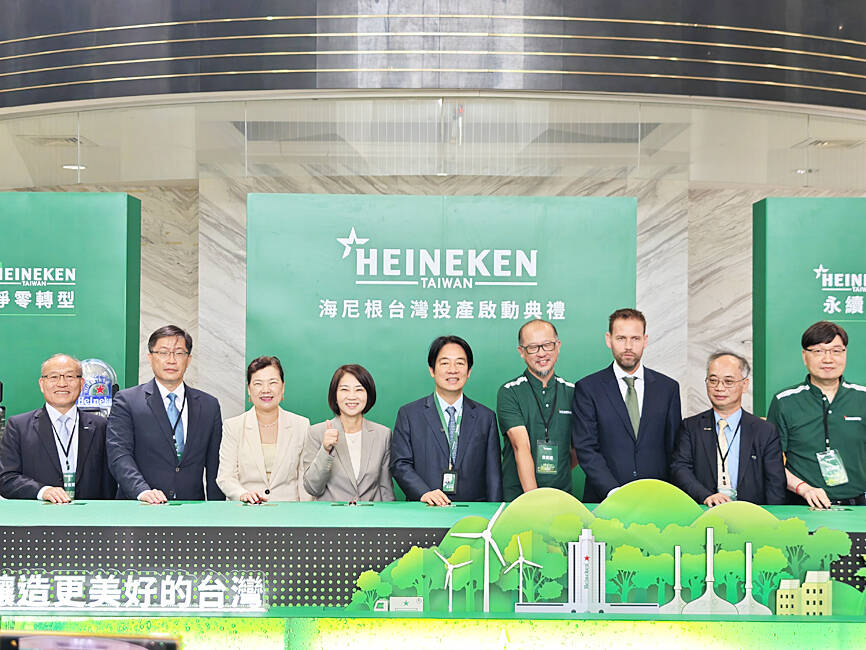Dutch brewing company Heineken NV on Friday announced an investment of NT$13.5 billion (US$414.62 million) over the next five years in Taiwan.
The first multinational brewing company to operate in Taiwan, Heineken made the statement at a ceremony held at its brewery in Pingtung County.
It also outlined its efforts to make the brewery “net zero” by 2030.

Photo: Chen Yen-ting, Taipei Times
Heineken has been in the Taiwanese market for 20 years, Heineken Taiwan managing director Jeff Wu (吳建甫) said.
With strong support from local consumers, the Dutch brewery decided to transition from sales to manufacturing in the country, Wu said.
Heineken assumed majority ownership and management rights of the Long Chuan Zuan Co (龍泉鑽興業) brewery in Pingtung County’s Neipu Township (內埔) in 2022.
The brewery began production in the first quarter of this year.
Wu said that Heineken hopes to supply “Made in Taiwan” products to neighboring countries from its Pingtung brewery, allowing Taiwan-made products to gain global recognition.
Taiwan is Heineken’s second-largest export market in the world, with production at the Pingtung brewery looking to supply the East Asian market, Vice President William Lai (賴清德) said during his speech at the ceremony.
The investment means a lot to Taiwan and its farmers, Lai added.
He said that Heineken’s Pingtung brewery seeking to go net zero is truly remarkable and should serve as a benchmark for others in Taiwan’s brewing industry.
The president-elect also mentioned Pingtung’s fertile soil and skilled farmers, saying that he hopes locally sourced brewing barley would elevate the Pingtung brewery and make it one of the Dutch company’s top-quality breweries among its 160 around the world.
Pingtung County Commissioner Chou Chun-mi (周春米) was also in attendance.
Chou said she was very happy that Pingtung is the first city in Taiwan to be chosen for production by an international brewing company and is proud to see “Made in Taiwan” on Heineken canned beer.

Vincent Wei led fellow Singaporean farmers around an empty Malaysian plot, laying out plans for a greenhouse and rows of leafy vegetables. What he pitched was not just space for crops, but a lifeline for growers struggling to make ends meet in a city-state with high prices and little vacant land. The future agriculture hub is part of a joint special economic zone launched last year by the two neighbors, expected to cost US$123 million and produce 10,000 tonnes of fresh produce annually. It is attracting Singaporean farmers with promises of cheaper land, labor and energy just over the border.

US actor Matthew McConaughey has filed recordings of his image and voice with US patent authorities to protect them from unauthorized usage by artificial intelligence (AI) platforms, a representative said earlier this week. Several video clips and audio recordings were registered by the commercial arm of the Just Keep Livin’ Foundation, a non-profit created by the Oscar-winning actor and his wife, Camila, according to the US Patent and Trademark Office database. Many artists are increasingly concerned about the uncontrolled use of their image via generative AI since the rollout of ChatGPT and other AI-powered tools. Several US states have adopted

A proposed billionaires’ tax in California has ignited a political uproar in Silicon Valley, with tech titans threatening to leave the state while California Governor Gavin Newsom of the Democratic Party maneuvers to defeat a levy that he fears would lead to an exodus of wealth. A technology mecca, California has more billionaires than any other US state — a few hundred, by some estimates. About half its personal income tax revenue, a financial backbone in the nearly US$350 billion budget, comes from the top 1 percent of earners. A large healthcare union is attempting to place a proposal before

KEEPING UP: The acquisition of a cleanroom in Taiwan would enable Micron to increase production in a market where demand continues to outpace supply, a Micron official said Micron Technology Inc has signed a letter of intent to buy a fabrication site in Taiwan from Powerchip Semiconductor Manufacturing Corp (力積電) for US$1.8 billion to expand its production of memory chips. Micron would take control of the P5 site in Miaoli County’s Tongluo Township (銅鑼) and plans to ramp up DRAM production in phases after the transaction closes in the second quarter, the company said in a statement on Saturday. The acquisition includes an existing 12 inch fab cleanroom of 27,871m2 and would further position Micron to address growing global demand for memory solutions, the company said. Micron expects the transaction to